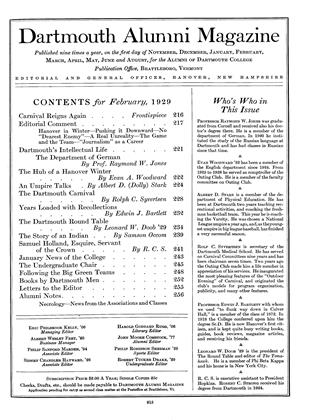The Dartmouth student body has ample facilities for keeping in touch with the outside world through the talks given at the College by experts from beyond New Hampshire. So many organizations, are bringing up speakers that the man with highly specialized interests will be given something to listen to at one time or another.
The French Club activity has been cited. The Biography Department offered two speakers on professional vocations during January. Professor Francis B. Sayre of the Harvard Law School spoke on "The Ideals, Opportunities, and Difficulties of Public Service." That in brief is a talk on why a young man should go into politics or the diplomatic service. Mr. Sayre is an author and was once Advisor in Foreign Affairs to the Siamese Government.
The second speaker in this course was President Livingston Farrand, of Cornell University, who spoke on "Teaching."
Mr. Farrand particularly stressed the fact that although the professorial profession has for years been advertised as underpaid, the financial returns of the average doctor, lawyer, or business man are not astoundingly greater, while the teacher's "instinct to push further the boundaries of knowledge" has no equal as an ideal among the professions of the world. Mr. Farrand further affirmed that while at onetimethemeager salaries accorded professors tended to repel many of the best minds from the profession, "the situation has improved very decidedly in the last 10 years. The increase has been slight, relatively speaking, but it means a great deal."
The Department of Psychology was represented last month by Dr. Kurt Koffka, formerly professor of the University of Giessen, Germany, and now at Smith College. His subject, "The Significance of Gestalt Psychology," was handled in a manner disap- pointing to the professors and students of Dartmouth who are eager to know more of this new German psychology. Wolfgang Kohler, another German, spoke here a year or two ago on the same subject. He told of his apes which behaved with "insight" or, in plain language, with real brains, and held that up to combat the behaviorists with their Russian Pavlov's dog which, according to Pavlov, acted like a machine. This all goes to prove, say the psychologists, that men either are or are not like either dogs or like apes. The behaviorists stigmatize the Gestalt Psychology as just some more German "intuition," and the idealist philosophers look to Gestalt to show that their much abused man is no machine after all.
On the same night that Kurt Koffka spoke, M. Funck-Brentano was over in Dartmouth Hall with his lantern slides of French home life; Professor Edmund H. Booth '18 was in the Tower Room reading publicly from "Othello," and A. K. Laing '25, author of "Fool's Errand," was telling The Arts about recent movements in poetry towards traditionalism in form. The habitual lecture hound had a busy time of it that evening, you can be sure.
 View Full Issue
View Full Issue
More From This Issue
-
 Lettter from the Editor
Lettter from the EditorEditorial Comment
February 1929 -
 Article
ArticleThe Dartmouth Round Table
February 1929 By Leonard W. Doob '29 -
 Article
ArticleThe Dartmouth Carnival
February 1929 By Rolph C. Syvertsen -
 Article
ArticleAn Umpire Talks!
February 1929 By Albert D. (Dolly) Stark -
 Article
ArticleThe Story of an Indian
February 1929 By Samson Occom -
 Class Notes
Class NotesCLASS OF 1923
February 1929 By Truman T. Metzel








